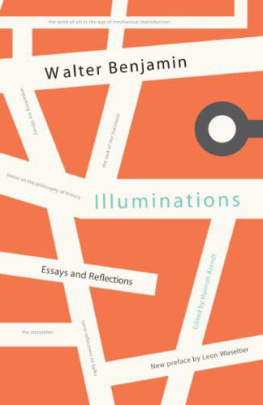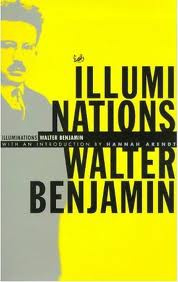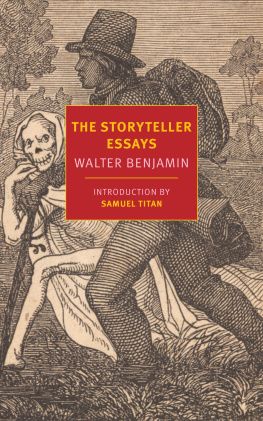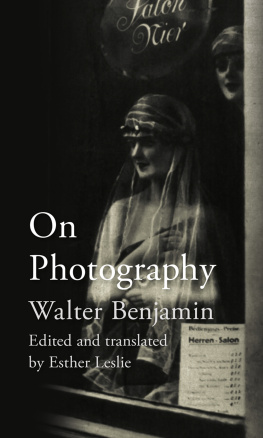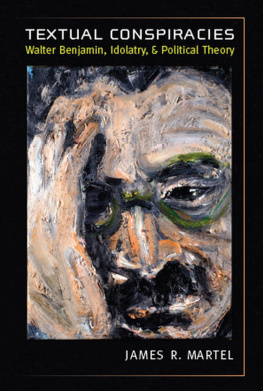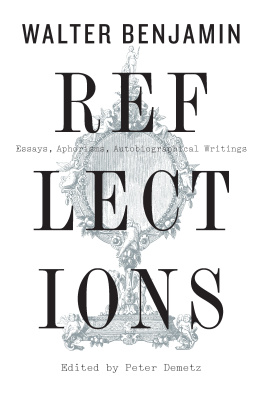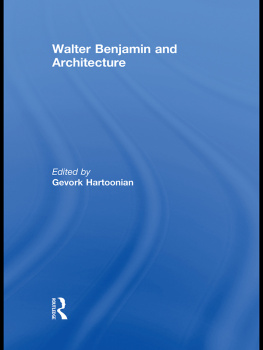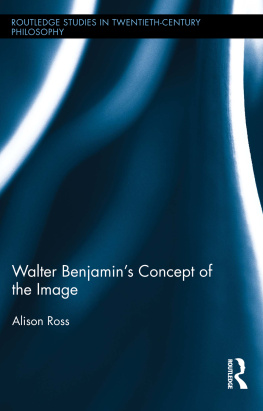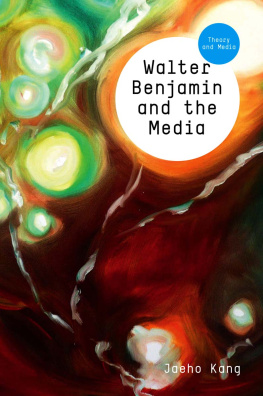Walter Benjamin - Illuminations
Here you can read online Walter Benjamin - Illuminations full text of the book (entire story) in english for free. Download pdf and epub, get meaning, cover and reviews about this ebook. year: 1968, publisher: Knopf Doubleday Publishing Group, genre: Science. Description of the work, (preface) as well as reviews are available. Best literature library LitArk.com created for fans of good reading and offers a wide selection of genres:
Romance novel
Science fiction
Adventure
Detective
Science
History
Home and family
Prose
Art
Politics
Computer
Non-fiction
Religion
Business
Children
Humor
Choose a favorite category and find really read worthwhile books. Enjoy immersion in the world of imagination, feel the emotions of the characters or learn something new for yourself, make an fascinating discovery.
- Book:Illuminations
- Author:
- Publisher:Knopf Doubleday Publishing Group
- Genre:
- Year:1968
- Rating:3 / 5
- Favourites:Add to favourites
- Your mark:
- 60
- 1
- 2
- 3
- 4
- 5
Illuminations: summary, description and annotation
We offer to read an annotation, description, summary or preface (depends on what the author of the book "Illuminations" wrote himself). If you haven't found the necessary information about the book — write in the comments, we will try to find it.
Illuminations — read online for free the complete book (whole text) full work
Below is the text of the book, divided by pages. System saving the place of the last page read, allows you to conveniently read the book "Illuminations" online for free, without having to search again every time where you left off. Put a bookmark, and you can go to the page where you finished reading at any time.
Font size:
Interval:
Bookmark:
TRANSLATED BY HARRY ZOHN
E DITED AND WITH AN INTRODUCTION BY HANNAH ARENDT
PREFACE BY LEON WIESELTIER
SCHOCKEN BOOKS NEW YORK
English translation copyright 1968 by Harcourt Brace Jovanovich, Inc.
Introduction copyright 1968 by Hannah Arendt
Preface copyright 2007 by Leon Wieseltier
All rights reserved. Published in the United States by Schocken Books, a division of
Random House, Inc., New York. Originally published in Germany by Suhrkamp
Verlag, Frankfurt a.M. copyright 1955 by Suhrkamp Verlag, Frankfurt a.M.
Published by arrangement with Harcourt Brace Jovanovich, Inc. (A Helen and Kurt
Wolff Book)
This reprint omits of the original Harcourt, Brace & World edition.
The introduction to this book, by Dr. Hannah Arendt, appeared originally as an arti
cle in The New Yorker.
Acknowledgment is made for permission to quote from the following:
From The Trial, by Franz Kafka, trans. by Edwin and Willa Muir. Copyright
1937 and renewed 1965 by Alfred A. Knopf, Inc.
From The Castle, by Franz Kafka. Copyright 1930, 1954 and renewed 1958 by
Alfred A. Knopf, Inc. Reprinted by permission of the publisher.
Library of Congress Cataloging-in-Publication Data
Benjamin, Walter, 18921940.
Illuminations.
Translation of: Illuminationen.
Reprint. Originally published: New York: Harcourt, Brace & World, 1968.
"A Helen and Kurt Wolff book"Verso t.p.
Included bibliographical references and index.
I. LiteratureAddresses, essays, lectures. I. Arendt, Hannah. II. Title.
PN37.B4413 1985 809 85-27865
ISBN 978-0-8052-0241-0
Printed in the United States of America
First Schocken paperback edition published in 1969
['09] 9 8 7 6 5 4 3
PREFACE BY LEON WIESELTIER
INTRODUCTION
Walter Benjamin: 18921940, by Hannah Arendt
UNPACKING MY LIBRARY
A Talk about Book Collecting
THE TASK OF THE TRANSLATOR
An Introduction to the Translation
of Baudelaire's Tableaux parisiens
THE STORYTELLER
Reflections on the Works of Nikolai Leskov
FRANZ KAFKA
On the Tenth Anniversary of His Death
SOME REFLECTIONS ON KAFKA
WHAT IS EPIC THEATER?
ON SOME MOTIFS IN BAUDELAIRE
THE IMAGE OF PROUST
THE WORK OF ART IN THE AGE OF MECHANICAL REPRODUCTION
THESES ON THE PHILOSOPHY OF HISTORY
EDITOR'S NOTE
INDEX OF NAMES
It is hard to imagine a time when Walter Benjamin was not a god (or an idol) of criticism, but I can remember when, in my own student days, not so long ago, he was only an exciting rumor. It was the publication of Illuminations, and then a few years later of Reflections, these lovingly assembled and beautifully translated volumes, that confirmed the rumor. These were the books that brought the news. I can report that in the bookshops around Columbia in its roiled years, before Broadway became a boulevard of theory, they were snatched up immediately and read with a hushed fascination. No sooner was Benjamin known than he was revered. I encountered Benjamin's name for the first time in the ornate dedication to Major Trends in Jewish Mysticism, the masterwork (talk about bringing the news!) of his devoted and disappointed friend Gershom Scholem, which was published a year after Benjamin's refugee suicide: "To the memory of Walter Benjamin (18921940), the friend of a lifetime, whose genius united the insight of the Metaphysician, the interpretative power of the Critic, and the erudition of the Scholardied at Port Bou (Spain) on his way into freedom." This is still the most elementary characterization of Benjamin's dense and elusive mind. It prepared me for the most significant quality of Benjamin's accomplishment, and also of his spirit: among the great modern intellectuals, he was the one who least added up.
Benjamin's great dispersal, enacted first by his mentality and then by his history, made him especially attractive. He was a naturally unsystematic man, a hero of fragmentation in the line of Novalis and Schlegel and Nietzsche. And yet he was not an enemy of old philosophy, not at all. To a degree that is still not adequately appreciated, Benjamin was happily steeped in German philosophy, and regarded his critical task as the philosophical analysis of literature and culture. In his restless and scattered way, he was carrying on the work of Hegel's Aesthetics, a foundational and unjustly discarded work that may be preposterous in its cosmic ideas but is magnificent in its local ideas. Benjamin had a similar gift for applying abstractions to pleasures. And to his explanatory fervor he added a fervor for observation: he saw more, in books and in places, than other people did, and he saw differently. The strangeness that you encounter upon reading Benjamin for the first time is almost a cognitive strangeness: he makes everything no longer familiar. His incompetence at ordinary living allowed him to see it more sharply. Like many of the insurgent children of the German Jewish bourgeoisie, he believed that banality was the enemy of life; but his anti-banalizing energy, the ferocity with which he mined the most commonplace objects and events for explosive meanings, was almost diabolical. ("The everyday as impenetrable, the impenetrable as everyday.") In his memoirs as in his essays, he seemed to require of every perception that it be a revolution. It was his premise that nothing is what it appears to be, and this made him into a scholar of appearances. He had an unappeasable appetite for the marginal and the idiosyncratic, because deviance looked to him like an epistemological advantage. Nothing that was not neglected could be true. All this led Benjamin into the underground of esoteric interpretation.
In his temperament and in his method, Benjamin was an esotericist. He was modernity's kabbalist. In his turgidly enchanted world there were only mysteries, locked and unlocked. His infatuation with Marxism, the most embarrassing episode of his mental wanderings, the only time that he acquiesced in the regimentation of his own mind, may be understood as merely the most desperate of his exercises in arcane reading. The text, this time, was history; but there was nothing that was not a text, for Benjamin. He was the most bookish of the agitator-intellectuals. (He looked ridiculous in the Ibiza sun.) He textualized the universe. This was because he was essentially an exegete, a glossator. Everything he wrote was commentary. The Paris Arcades project is, among other things, a milestone in the history of commentary, an astounding renovation of an old point of regard for a new reality. Like the great medieval commentators, Benjamin demonstrated by example that commentary may be an instrument of originality. And in his case, not only of originality, but also of redemption: in Benjamin's view, interpretation does not so much discover meaning as release it, and loose it upon the world so as to liberate it. Benjamin read messianically. Insight, for him, was a variety of intoxication. Indeed, his quest for delirium in criticism made his political writings finally useless for politics. "The realization of dream elements in waking is the textbook example of dialectical thinking": no government ever trembled before such a dialectic. For all his proclamations of political solidarity, Benjamin finally represented only himself, and his own introverted and inextinguishable hunger for a secret knowledge, an initiation, a revelation. He was a failed mystic living amid failed sanctities, and struggling against the failures.
These volumes may be read almost as a spiritual diary. They give a portrait of a pilgrim. But this pilgrim makes no progress, and his story at some point ceases to be stirring, and becomes alienating, and then crushing. It is not only the evil circumstances of Benjamin's death that leave one with a gathering pity for him. His dispersal comes to seem cunning, vain, frantic, sometimes dilettantish, sometimes animated by an aspiration to cultural powera dazzling distraction from the possibility that there may have been nothing lasting at the core. Benjamin can be at once overflowing and vacant; a student of hiddenness nervously in hiding; a pilgrim without a shrine. Scholem begged Benjamin to make a choice and a commitment (and to make the choice and the commitment that he himself had made); and whereas it is true that Scholem was almost monstrous in his consistency of purpose over the years, he was right to worry about the spiritual implications of Benjamin's indecisiveness. And this indecisiveness, which may have cost Benjamin his life, was unattractively joined to a weakness for dogmatic certitude. The uncertainty that Scholem deplored was really a petrification by certainty, or a series of such petrifications. Benjamin's work was scarred by a high ideological nastiness, as when he mocked "the sclerotic liberal-moral-humanistic ideal of freedom" (as if Europe in his day was suffering from a surfeit of this), and speculated acidly about the belief in "the sacredness of life" (or from a surfeit of this), and responded with perfect diffidence to the censorship and the persecution of writers in the Soviet Union, which he coldly described as "the transfer of the mental means of production into public ownership." The pioneering explorer of memory worshipped history too much. He also wrote too much: he advised writers to "never stop writing because you have run out of ideas," and often he acted on his own advice. I confess that there are many pages in Benjamin that I do not understand, in which the discourse seems to be dictating itself, and no direction is clear. Like many esotericists, he abuses the privilege of obscurity.
Font size:
Interval:
Bookmark:
Similar books «Illuminations»
Look at similar books to Illuminations. We have selected literature similar in name and meaning in the hope of providing readers with more options to find new, interesting, not yet read works.
Discussion, reviews of the book Illuminations and just readers' own opinions. Leave your comments, write what you think about the work, its meaning or the main characters. Specify what exactly you liked and what you didn't like, and why you think so.

